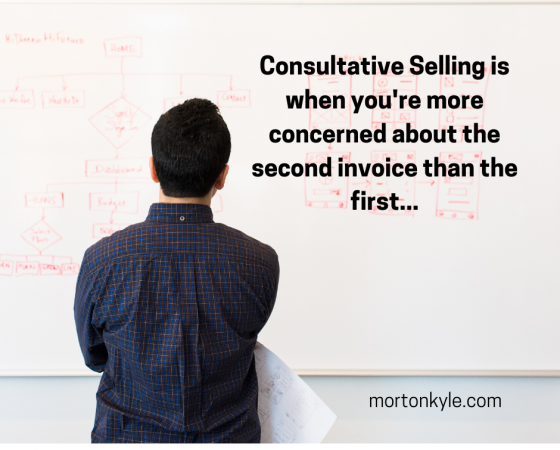What is Consultative Selling?
Consultative selling is when a sales rep takes the time to really understand the prospect, their position, their needs, challenges, environment and circumstances BEFORE they start to sell anything.
In doing this, any sales proposition put forward by the sales rep is grounded in the prospect’s reality, to such an extent that it is valuable, worthwhile and meaningful.
This way, trust, rapport and mutual respect is built within the sales rep and prospect relationship.
Should You Be Using Consultative Selling with YOUR Sales Prospects?
Whilst no tick box exercise is ever perfect for defining if you should be using consultative selling with your prospects, I have tried to provide a simple check list for you to scan so you can answer this question for yourself.
If you’re answering YES below and NOT currently using consultative selling you may be leaving your sales team exposed in their sales outreach, meaning they’re missing out on signing up customers that rightly belong to you but are currently being converted using consultative selling methods by your lesser competitors…
How many of these apply to you?
- Competitive product/service
- Strong ROI case
- Lots of great case studies
- Longer sales cycle
- Complex solution
- Bespoke solution
- Integrated products/services
- You provide solutions that have lots of substitution options or workarounds your prospects could use
- Long term commercial relationship with the prospect
How did you answer? A few ‘YES’s’?
Then you really should consider using consultative selling to fully maximise your sales outreach and sales lead conversion.
Does it mean that you can’t use consultative selling if you don’t tick all of these boxes?
Absolutely not, it’s just that it might not be worth the effort, and, in some cases it may actually alienate your prospect base, especially in those situations where:
- Cost is the primary driver
- You’re in a price driven space / market
- You’re products / services are commodities and price is the primary differentiator
- It’s a transactional relationship between you and your prospect
- The market is mature
- The sales cycle is short
- You’re offering a nice to have rather than a need to have
If you’ve still unsure – you can always talk to me and we’ll sign post you – book your call – 0779 002 1885
What Makes Consultative Selling So Effective?
Consultative selling is about putting the absolute customer needs at the heart of the sales exchange.
It’s about investigating exactly what the prospect wants and needs.
Understanding their wish list.
The problems they need to solve.
The scope, the size, the impact and the origins and trajectories of those problems.
What they need from the sales process as much as the product and service you supply.
What their long terms needs are from you as a supplier partner
It’s working on the quality of the relationship and the level of trust between you and the prospect…
In a nutshell…
Consultative Selling is when you’re more concerned about the second invoice than the first…you want the trust, you need the relationship, in order to be the ‘trusted advisor’, because without these, your sales pitch will be just that, a shot in the dark at best
Trust, honest, openness, transparency are all critical within a consultative sales conversation because you’ll find yourself in territories typically not visited in other sales methods. When you adopt a consultative selling approach you’ll spend time talking about risk, investment, shared risk, value, return on investment, penalties, paybacks, guarantees, competitor solutions, business cases, structured plans, internal and external politics….it’s a wide ranging field.
All contentious issues in many situations, so you can see why having trust is critical.
How to Establish a Position of Trust in Consultative Selling
One of the easiest ways to do this is to bring value to the prospective buyer.
This may be in the form of solid experience, new insight, proven understanding of the trading conditions within the prospects industry, current and up coming problems and potential solutions. The prospect can start to look at you as their window to their world, where you have a recognisable voice.
That may be via a proven proof of concept model, it maybe in the form of innovative ideas, research based solutions or simply being a figure of authority in the sector your prospect is in…
In fact, this is one of the key reasons why many industry experts niche their solutions, because it dramatically helps them build credibility with prospects. If you’re interested in niching your solution – take a read at our article on how Savvy Sales Teams Niche
Is Solution Selling the Same as Consultative Selling?
No.
But solution selling does form the basis of consultative selling.
Solution selling originated in the 1960’s.
Late on in the 60’s when big office machinery was being introduced it was evident that each photocopier, for example, was exactly the same an another photocopier.
So how was a prospect supposed to select the one they wanted when they were both good machines, sold by nice sales guys?
Well of course, they could always buy the cheapest?
Ouch…!
So, these sellers of large capital equipment (because that is what a photocopier was at that time) decided that they needed to get super smart about how the positioned their machines in front of prospects who were also getting pitches from every other ‘black box’ sales person in the region.
Solution selling was born!
Solution selling fixated on looking for the solution that the prospect wanted to solve in relation to the problem that they currently had, for example…
30 typists in the typing pool all typing out duplicate information all day every day – costly beyond belief, tough to constantly recruit for, needed an management team to keep the work flow going, occupied space which was expensive etc etc, you can see how the case for a single black box in the corner of the office started to look appealing?
So, why not type a doc once and photocopy it?
Wow – what a saving.
So you see:
Problem: costly problematic typing pool
Solution: photocopier
The savvy bit came when the sales person needed leverage to get the prospect to buy.
The sales person could remind the prospect of all the problems associated with running a large typing pool…commonly known today as the ‘Cost of Doing Nothing Pitch…’ versus the joy of just having a simple black box.
Plus – the savvy sales person would calculate what the cost saving would be over 12 months, 24 months for added weight to his reasons the prospect really should buy.
Voila!
The prospect feels a mug for not making this efficiency saving and the deal is done.
So, the sale wasn’t about buying the copier anymore, it WAS about solving a problem.
This was the start of a movement that says – what you sell is less important than how you sell
Anyway, you get, the very brief gist of solution selling.
How Does Consultative Selling Differ From Solution Selling?
Solution selling looks at the cost of not taking action in terms of the problem it solves, their cost savings etc, it also considers the cost in terms of stress goodwill, physical resources…
But consultative selling goes way past where solution selling stops…
Consultative selling means you typically have to build solutions tailored to the prospects very specific needs and circumstance
It means you probably start selling much later in the engagement than you would if you were using a solution selling framework.
You’ll more likely find yourself operating as a Consultant before you migrate to being a sales rep.
There are likely to me more people involved – from your side and the prospect’s side – in the scoping out phase than there are in a typical sales pitch.
You’ll find yourself modelling solutions rather than presenting absolutes for the prospect to say yes/no to.
In some instances, it may also mean that both parties go into this shared risk from a position of full disclosure
In additions, it means that the level of sharing, insight and knowledge exchanged by both sides is at the highest level.
Consultative Selling is NOT for Every Sales Team
But there are elements that can be used effectively in many sales situations, like:
- Being able to challenge a buyers preconceived ideas
- Bumping prospects out of that ‘we’ve always done it this way’ mindset
- Demonstrating high levels of value
- Getting rid of hit and run competitors at any stage in the pitch
- Building a strong ROI framework
- Engaging multiple stakeholders to build urgency
- Easing through decisions that may stall through lack of consensus or buy in
Consultative Selling Training
Introducing a consultative sales approach to a sales function can be a game changer, with the one stipulation that it is an ‘all or nothing’ commitment, because to work at it’s most effective this methodology should be part of the sales DNA within an organisation.
As part of our Sales Improvement Workshop we cover all the elements of consultative selling training – from the coldest of cold outreach to getting the order signed.
In easy to digest, understand and apply, our consultative selling training has helped thousands of sales reps to
- Elevate their sales results
- Build high quality sales pipelines
- Create a sales conversion engine
- Maximise their sales conversion rates
- Build advocacy and raving fans within the prospect base
- Forge relationships that have paid dividends over many years
As a means to moving away from hit and run sales, and instead, distinguishing your offering from that of competitors and giving your prospects the best possible sales experience when dealing with your sales reps then you will find our consultative selling training a great way to get started and very powerful selling method to have in your tool-kit.
If you’re tired of losing orders to lesser competitors and want to really shake up your sector – then consultative selling might be just what you’re looking for – 0779 002 1885 – let’s chat!

Hi, welcome to Morton Kyle Limited.
As Founder and Lead Consultant, I’ve spent the last 30+ years in the trenches of sales—fixing broken pipelines, rebuilding underperforming teams, and helping businesses close more deals at higher margins.
I’ve worked with global brands, challenger firms, and fast-growth sales teams, helping them:
✔ Fix underperforming pipelines – turning ghosted leads into closed deals.
✔ Increase win rates – without discounting or chasing bad-fit prospects.
✔ Build sales systems that actually work – so you don’t waste time on ‘busy work’ that doesn’t convert.
I’m not another ‘sales trainer.’ I don’t teach theory. I fix sales problems – fast. And if you’re still reading, it means you’ve got a problem that needs fixing.
I know how sales leaders think because I’ve been one. I know what the board wants because I’ve sat in those meetings.
And I know what works – because I’ve done it, tested it, and proved it across industries, markets, and economic downturns.

